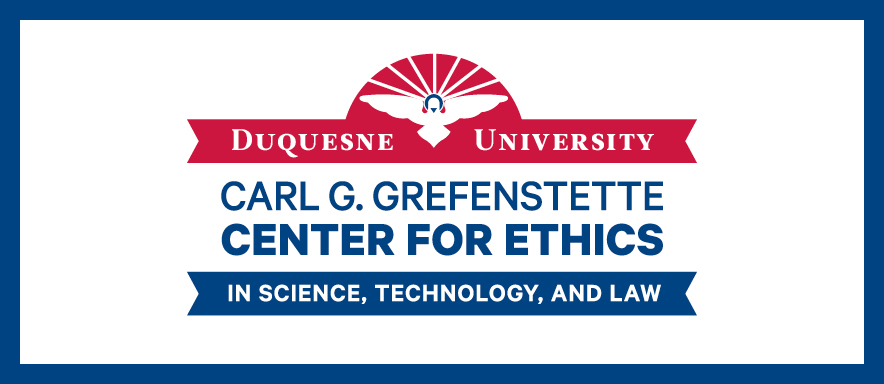New Fellows to Direct Grefenstette Center
A new group of interdisciplinary scholars will lead a Duquesne center whose focus is on the nexus between ethics and science, technology and law from a Catholic faith-based perspective.

Four fellows were named by the Carl G. Grefenstette Center for Ethics in Science, Technology and Law, which was established in 2019 to better understand how the rapid pace of technology is impacting society.
“We are excited to have such exemplary scholars lead the Grefenstette Center,” said Dr. Gerry Magill, the Vernon F. Gallagher Chair for the Integration of Science, Theology, Philosophy and Law. “As issues surrounding misinformation and technology proliferate, the center’s work in considering the ethical and societal implications of advanced technology, including the effects on vulnerable populations, becomes even more crucial.”
The Grefenstette Fellows will work together to direct the center’s efforts and develop programming that addresses the complex issues created by technological advancements.
Dr. John Slattery, senior program associate at the American Association for the Advancement of Science (AAAS), will serve as the directing fellow for the team. An expert on science, ethics and religion, he managed a $6.5 million grant to oversee the Science for Seminaries program at the AAAS. The author of the book Faith and Science at Notre Dame, Slattery also teaches and speaks regularly on science and theology at various conferences.
“The Fellows’ collaborative spirit and deep understanding of technology and ethics, along with their shared interest in viewing the intersection of their emerging fields through a distinctly Catholic lens, is a strong statement about how the Grefenstette Center will operate,” said President Ken Gormley. “Not only is their work on pressing issues valuable and relevant to Duquesne’s heritage, they set an inspiring example for our students about how to expand horizons in their work to serve and benefit others.”
Created by a $1.5 million gift from the Henry L. Hillman Foundation, the Grefenstette Center draws from Duquesne’s nine schools to conduct sponsored research and organize conferences, symposia and other scholarly endeavors. It also works to strengthen partnerships with leading research institutions, professional organizations, other regional Catholic colleges and universities, and scholars and communities of different faith traditions across the globe.
“I look forward to working with all of my colleagues to encourage interdisciplinary discussions that embody the Catholic Spiritan ethos of Duquesne,” Slattery said. “This includes programs promoting equity and inclusion that address significant social issues, such as poverty, racism and the climate crisis.”
The center’s fellows also include:
- Nathan Colaner, managing director of the Initiative in Ethics and Transformative Technologies at Seattle University, who has extensively studied and written on the ethical issues of big data management and the business use of artificial intelligence
- Matthew Gaudet, lecturer of Engineering Ethics at Santa Clara University, whose research focuses on the intersection of moral theology and social science, with a particular interest in disability ethics, technology ethics and the ethics of war and peace
- Patrick Juola, professor of computer science at the McAnulty College and Graduate School of Liberal Arts, who studies the psychology of language and created software that identified J.K. Rowling as the author of The Cuckoo’s Calling even though she wrote it under a pen name.
Visit the Grefenstette Center website for more information.
